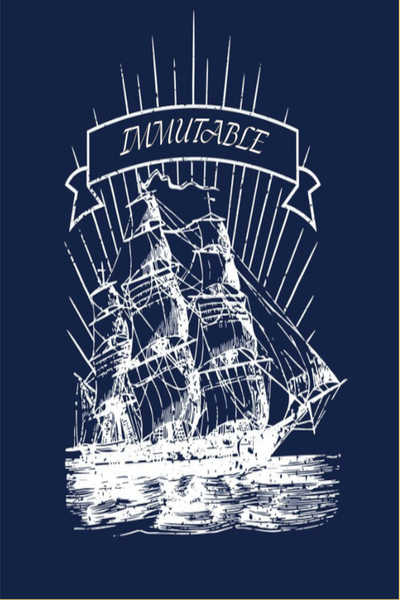A light breeze ruffled Millicent’s hair as she sat on the deck of the Hare’s Breath, watching the ship’s crew work on repairs. The Sun overheard warmed her skin pleasantly though may have been a burden to the working deckhands, whose brows and arms were beaded with sweat. Some climbed the remaining mast, working on rigging, while others shaped and sanded the log that would replace the damaged one.
Millicent idly nibbled on her lunch, a modest meal of bread and broth. That was fine—she didn’t have much of an appetite. That was not a commentary on the food, which she found to be surprisingly flavorful—much better than what she had become accustomed to eating—but rather a sign of her worry.
She had been freed of the cage yesterday evening after speaking with the captain of the ship. She was unsure what to make of the strange captain but was relieved not to be blamed for their current predicament. Still, Millicent must stay on guard—she did not know these people and recent experience had taught her not to trust others so easily.
Certainly not those who would imprison her at a time of need and desperation. Millicent’s eyes narrowed as she looked upon Ballast, the boatswain who first saw her and brought her on board. He stood directing the deckhands and lending them a hand when needed. His skin was a deep bronze, sun-kissed, darker than the rest of the crew. Maybe he was not from Tellapor at all. She knew his caution with her was reasonable but couldn’t help but feel a little resentful.
Millicent let her mind wander, and it went, as it often did, to the events of the past year that led her to this ship at the edge of ruin.
She was numb by the time the soldiers arrived at her doorstep, their uniforms stiff, green, and multi-pocketed, standard issue in the Tellavarian armed forces. Her father, something of a local legend, a mapper known for his pinpoint accurate movement projections, had not returned home from his most recent tour. His ship was three months late from its projected return date, and the rumors in her town had already been swirling for weeks. Wallace Faraday was never late.
The soldiers confirmed Millicent’s worst fears—there had been no communications received from her father’s ship. The ship and its crew was presumed dead, likely caught in a bad storm while on the open sea or else attacked by pirates.
Their small family had been reduced again. Now it was just Millicent, her young brother, Vincent, and her grandmother. How would they survive?
She had just turned eighteen and was supposed to begin her formal apprenticeship under her father, though he had been training her in between tours since the age of ten. In truth, she already knew more than many mappers twice her age. She just lacked the practical experience.
Her grandmother was too old to work. She helped care for Vincent, who was only nine years of age, and could cook and sew. But where would their food and clothing come from?
It was up to Millicent to provide those things now. And it was that responsibility that allowed Millicent to bury her grief over the loss of her father. The despair within her, though, was like a dark storm cloud; it loomed overhead, threatening to burst at any time. But not now, she would tell herself. Not now.
Millicent took odd jobs around town for a time. She assisted a cobbler during a busy week. She substituted for a tavern worker who was ill for a few days. In most cases these jobs were a way for the local townspeople who knew and respected her father to offer their sympathy and provide aid to the family. But there is only so much financial aid a small seaside town can offer, and soon Millicent found herself in need of work.
And so she appealed to the navy that her father lost his life serving to allow her to follow in his footsteps. They refused to make her a full-fledged mapmaker on one of the navy’s survey ships, citing her lack of time at sea. They did offer her an apprentice’s role, but apprentices were paid a pittance. Not enough to support her brother and grandmother. Millicent sought an alternative.
There was one other option, she was told. The navy was assembling a crew for covert assignments. Missions for which the Tellavarian government would not claim responsibility. It would not be a survey ship but would require someone with mapmaking knowledge. And it paid well. Millicent should have been suspicious, but her desperation interfered with her better judgment. She accepted the role and was soon set out on the Lady Luck.
Millicent quickly realized that she had made a mistake. The crew of the Lady Luck was comprised of of rogues and criminals and was captained by a dangerous man who sought fortune at sea. Their missions consisted mostly of spreading misinformation and sabotaging ships of other nations. It felt antithetical to everything her father believed in. She felt ashamed.
But it was their initial assignment at Curvata Appa that truly horrified her. The captain did not tell her all the details—by then he likely sensed her increasing disapproval and disdain for their collective actions. They sailed the neighboring seas of the island nation until coming across a survey ship from Tellapor. The captain and crew feigned friendliness, requesting access onboard to swap survey notes, which the Tellaporish were happy to oblige. When the opportunity arose, they began slaughtering the Tellaporish crew.
Millicent could not stomach the wonton murder. What had this survey team done to deserve such a fate? Millicent knew the answer was nothing.
It was then that she decided to flee the Lady Luck. She tried doing so during that very assault, but some of her own crew saw her boarding a rowboat on the survey ship and stopped her. The only solace she could take from the failed attempt to flee was it served as a distraction to allow a single injured Tellaporish sailor to escape. No one saw him leap overboard, nor did they notice him crawl into the rowboat she had lowered to the water. They were too concerned about her—the deserter.
She requested her release from service, but the captain denied her request. She wasn’t sure whether he was acting with the authority of their superiors in Tellavar’s navy, but he was the authority on the ship so it did not matter. From that point on, she was treated like a hostage. The captain sought her out when he needed something, like when he impersonated a mapper to speak with officials on Curvata Appa, but otherwise she was confined to her cabin. That was how her situation remained until yesterday.
Millicent knew based on the shouts outside and by looking through the small porthole in her cabin what was happening. They were firing upon a ship. She had been waiting for this type of opportunity—everyone on the Lady Luck would be on the main deck or gun deck. It was her chance to escape!
She disabled the lock of her cabin—she had spent the preceding weeks determining a way to do that—and crept out. She would not risk being seen by going to the rowboats. She would find an alternative escape.
It was then that she felt a violent shake of the ship and heard the cracking of wood. A few moments later, another shake and more wood splintering. They had been hit. Twice. And Millicent ran straight in the direction of the noise. When she arrived, she saw a pair of gaping holes in the side of the hull. Some bloodied remains of crew members were strewn as was shattered wood and other debris. Without a moment’s hesitation, before someone still alive could stop her, Millicent sprinted to one of the holes and leapt through it and into the water below.
She crashed into the water, her tunic proving to be an immediate impediment to her cause, and began swimming away from the Lady Luck, which, before too long, turned in the opposite direction.
Relief came over her. They either had not noticed her escape or did not care and were soon gone from her sight.
Millicent swam toward an island nearby, taking frequent breaks. She was not trained for this type of exertion and would quickly get out of breath. It was hard to know how long she went on like that, swimming for a short distance, then floating, and then swimming again. Millicent was certain that it must have been a shorter amount of time than what it felt like. But after some period of time, she noticed a rowboat riding the gentle waves of the ocean, coming from the direction of the ship that had been attacked by the Lady Luck. Perhaps someone on the ship had seen her and come to help!
Millicent changed directions and swam toward the rowboat. This was her salvation. The fact that she could not see anyone seated in the boat only made her more certain. She had endured her father’s unexpected passing and witnessed cruel acts performed by the crew of the Lady Luck with her help. But the rowboat’s inexplicable appearance in her time of need was a sign from the universe. Her plunge into the sea cleansed her, and climbing into that boat would be a new beginning.
Tears mixed with the salty sea as Millicent swam. Tears of anguish over her father. Tears of concern for her brother and grandmother. Tears of guilt over what crimes she had been accessory to. And tears of joy for another chance.
Millicent finally reached the rowboat. She had done it! She pulled herself up and into the boat, laughing as she lied there. And then she screamed. Beside her was a dead body. A dead body she recognized. The sailor whose escape she aided months earlier was dead. And so too was her hope for salvation.










Comments (0)
See all